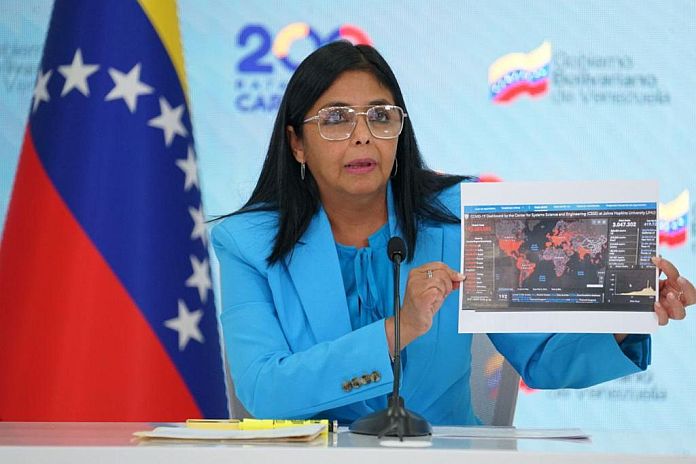By Andreína Chávez Alava
Guayaquil, Ecuador, (venezuelanalysis.com) – Venezuelan vice president Delcy Rodríguez condemned the global inequality in access to vaccines and called for “no injustices in this battle against COVID-19.”
Participating in the 27th Ibero-American Summit held in Andorra on Wednesday, Rodríguez pointed out that the World Health Organization (WHO) has warned of the consequences of unequal distribution of vaccines. She stated that “in high-income countries, one in four citizens is vaccinated; in middle-income countries, it is one in 500 citizens.”
Rodríguez stressed that the COVID-19 pandemic had deepened long-standing global inequalities. She recalled the latest Oxfam report, which revealed that the 1,000 biggest individual fortunes on the planet returned to their pre-pandemic levels within just nine months, whereas for the world’s poorest it will take more than a decade.
“Global inequality has been evident during this pandemic,” she said, adding that “if we, as an Ibero-American community, really want to overcome this situation, we can not do it alone.” She called on member countries to build bridges and communication spaces.
The Venezuelan vice president went on to praise the 22 country representatives’ shared concern about equitable access to COVID-19 vaccines and flexible funding for economic recovery. In this regard, she highlighted that two countries in the Ibero-American community are victims of blockades and unilateral coercive measures, referring to Venezuela and Cuba.
Rodríguez complained that “there are resources seized from the Venezuelan people” inside the Ibero-American community. She asked the Portuguese president Marcelo Rebelo de Sousa and prime minister António Costa, who was present in the virtual meeting, “to cooperate so that Venezuela can attend to this pandemic,” without political conditions or double standards.
According to the Venezuelan government, more than US $1.6 billion remain frozen since 2019 in Portugal’s Novo Banco private bank. The US, Spain, the United Kingdom, France, Belgium have likewise blocked some $6 billion worth of assets. Washington alone has frozen $342 million held by the Central Bank and seized state oil company PDVSA’s US subsidiary, CITGO.
Venezuela has constantly denounced being cut off from the international banking system and credit lines as part of the US “collective punishment” to force regime change. The measures levied against Caracas include financial sanctions, secondary sanctions against third parties trading with Venezuela, and an oil embargo in 2019. Washington likewise shut down oil-for-food and crude-for-diesel swap deals in 2020.
Consequently, the Nicolás Maduro government has stressed that the US-led sanctions have hindered the country’s response to the COVID-19 pandemic, including the purchase of vaccines, respirators, testing kits and other medical supplies.
However, the South American country has fared better than others in the region. On Wednesday, April 21, Venezuela registered 1,009 new Covid-19 cases and 21 deaths, elevating the total figures to 186,745 and 1,965, respectively.
The country has acquired 11.3 million COVID-19 vaccines through the United Nations’ COVAX program to cover 20 percent of the population. Nevertheless, the shipment arrival is unknown. Venezuela has received 800,000 vaccines to date, between 500,000 Sinopharm doses donated by China and 300,000 Sputnik V doses, the latter out of a ten million purchase from Russia. Healthcare workers, security forces, educational personnel, and the elderly have been prioritized thus far.
Furthermore, Caracas signed deals to participate in Russia’s EpiVacCorona vaccine trials and phase 3 clinical trials for the Cuban-made Abdala and Soberana 02 vaccines, with a view towards producing Cuban vaccines in the national territory.
Unilateral coercive measures and asset freezes have also hurt Venezuela’s ability to address its ongoing economic crisis. During her videoconference in the Ibero-American Summit, the Venezuelan vice president blasted the International Monetary Fund (IMF) for denying access to Venezuela’s share of $5 billion in Special Drawing Rights (SDR).
The IMF alleges a dispute among its members over who the country’s legitimate president is, with the US and allies recognizing self-proclaimed “interim president” Juan Guaidó. The Maduro government recently accused the opposition leader of trying to “steal” $53 million in Venezuelan funds, frozen by Washington, to maintain his parallel “administration” and finance destabilization efforts.
“All countries of the international community have an inalienable right to the Special Drawing Rights announced by the IMF, but the first thing IMF spokesmen say is that Venezuela won’t have access for political reasons,” Rodríguez asserted, blasting the Fund’s “double standards” and calling for respect for the country’s sovereignty.
The SDR is an international reserve asset created in 1969 to supplement IMF members’ official reserves, according to the Fund’s website. The IMF’s board of governors is expected to approve a $650 billion disbursement to help low-income countries deal with mounting debt and boost global liquidity amidst the COVID-19 pandemic. In 2009, the Fund allocated SDR 182.6 billion during the global financial crisis, with Venezuela a reported reserve beneficiary at the time.
The estimated $5 billion would prove a significant boost to Venezuela’s reserves, which currently stand at decades lows. The inability to access financial markets and credit lines have forced the Venezuelan Central Bank to use gold reserves to pay for food, fuel and other imports.





